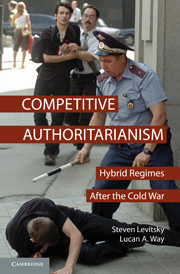Book contents
- Frontmatter
- Contents
- Acknowledgments
- Acronyms and Abbreviations
- Part I Introduction and Theory
- 1 Introduction
- 2 Explaining Competitive Authoritarian Regime Trajectories: International Linkage and the Organizational Power of Incumbents
- Part II High Linkage and Democratization: Eastern Europe and the Americas
- Part III The Dynamics of Competitive Authoritarianism in Low-Linkage Regions: The Former Soviet Union, Africa, and Asia
- 8 Conclusion
- Appendix I Measuring Competitive Authoritarianism and Authoritarian Stability
- Appendix II Measuring Leverage
- Appendix III Measuring Linkage
- Appendix IV Measuring Organizational Power
- References
- Index
1 - Introduction
Published online by Cambridge University Press: 05 June 2012
- Frontmatter
- Contents
- Acknowledgments
- Acronyms and Abbreviations
- Part I Introduction and Theory
- 1 Introduction
- 2 Explaining Competitive Authoritarian Regime Trajectories: International Linkage and the Organizational Power of Incumbents
- Part II High Linkage and Democratization: Eastern Europe and the Americas
- Part III The Dynamics of Competitive Authoritarianism in Low-Linkage Regions: The Former Soviet Union, Africa, and Asia
- 8 Conclusion
- Appendix I Measuring Competitive Authoritarianism and Authoritarian Stability
- Appendix II Measuring Leverage
- Appendix III Measuring Linkage
- Appendix IV Measuring Organizational Power
- References
- Index
Summary
The end of the Cold War posed a fundamental challenge to authoritarian regimes. Single-party and military dictatorships collapsed throughout Africa, post-communist Eurasia, and much of Asia and Latin America in the late 1980s and early 1990s. At the same time, the formal architecture of democracy – particularly multiparty elections – diffused across the globe.
Transitions did not always lead to democracy, however. In much of Africa and the former Soviet Union, and in parts of Eastern Europe, Asia, and the Americas, new regimes combined electoral competition with varying degrees of authoritarianism. Unlike single-party or military dictatorships, post–Cold War regimes in Cambodia, Kenya, Malaysia, Mexico, Nigeria, Peru, Russia, Serbia, Taiwan, Ukraine, Zimbabwe, and elsewhere were competitive in that opposition forces used democratic institutions to contest vigorously – and, on occasion, successfully – for power. Nevertheless, they were not democratic. Electoral manipulation, unfair media access, abuse of state resources, and varying degrees of harassment and violence skewed the playing field in favor of incumbents. In other words, competition was real but unfair. We characterize such regimes as competitive authoritarian. Competitive authoritarian regimes proliferated after the Cold War. By our count, 33 regimes were competitive authoritarian in 1995 – a figure that exceeded the number of full democracies in the developing and post-communist world.
The study of post–Cold War hybrid regimes was initially marked by a pronounced democratizing bias. Viewed through the lens of democratization, hybrid regimes were frequently categorized as flawed, incomplete, or “transitional” democracies.
- Type
- Chapter
- Information
- Competitive AuthoritarianismHybrid Regimes after the Cold War, pp. 3 - 36Publisher: Cambridge University PressPrint publication year: 2010
- 2
- Cited by

